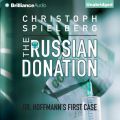 The Self-Donation of God
The Self-Donation of God
Автор: Jack D. Kilcrease
Год издания: 0000
In The Self-Donation of God, Jack Kilcrease argues that the speech-act of promise is always an act of self-donation. A person who unilaterally promises to another is bound to take a particular series of actions to fulfill that promise. Being that creation is grounded in God's promising speech, the divine-human relationship is fundamentally one of divine self-donation and human receptivity. Sin disrupts this relationship and therefore redemption is constituted by a reassertion of divine promise of salvation in the face of the condemnation of the law (Gen 3:15). As a new and effective word of grace, the promise of a savior begins the process of redemption within which God speaks forth a new narrative of creation. In this new narrative, God gives himself in an even deeper manner to humanity. By donating himself through a promise, first to the protological humanity and then to Israel, he binds himself to them. At the end of this history of self-binding, God in Christ enters into the condemnation of the law, neutralizes it in the cross, and brings about a new creation through his omnipotent word of promise actualized in the resurrection.
 Russian Donation
Russian Donation
Автор: Christoph Spielberg
Год издания:
 Understanding Organ Donation
Understanding Organ Donation
Автор: Eusebio Alvaro M.
Год издания:
This highly important book introduces the realm of organ donation, providing an overview of the current situation, highlighting the challenges, summarizing past research, and providing guidance for future research. The first book to bridge the gap between applied research and the social and behavioral issues surrounding organ donation An impressive collection of contributors from a range of both practitioners and scientists actively working in the field Provides a concrete example of how evidence-based research and theory can be applied with real-world value Explores future directions of organ donation and research including community-based health interventions, ethical considerations, and advancing donor registration The latest publication in the prestigious Claremont Applied Social Psychology Series
 Death and Donation
Death and Donation
Автор: D. Scott Henderson
Год издания:
Since its inception in 1968, the brain-death criterion for human death has enjoyed the status of one of the few relatively well-settled issues in bioethics. However, over the last fifteen years or so, a growing number of experts in medicine, philosophy, and religion have come to regard brain death as an untenable criterion for the determination of death. Given that the debate about brain death has occupied a relatively small group of professionals, few are aware that brain death fails to correspond to any coherent biological or philosophical conception of death. This is significant, for if the brain-dead are not dead, then the removal of their vital organs for transplantation is the direct cause of their deaths, and a violation of the Dead Donor Rule.
This unique monograph synthesizes the social, legal, medical, religious, and philosophical problems inherent in current social policy allowing for organ donation under the brain-death criterion. In so doing, this bioethical appraisal offers a provocative investigation of the ethical quandaries inherent in the way transplantable organs are currently procured. Drawing together these multidisciplinary threads, this book advocates the abandonment of the brain-death criterion in light of its adverse failures, and concludes by laying the groundwork for a new policy of death in an effort to further the good of organ donation and transplantation.
 Having Your Baby Through Egg Donation
Having Your Baby Through Egg Donation
Автор: Evelina Weidman Sterling
Год издания:
Having Your Baby Through Egg Donation is a helpful, authoritative guide to negotiating the complex and emotive issues that arise for those considering whether or not to pursue egg donation. It presents information clearly and with compassion, exploring the practical, financial, logistical, social and ethical questions that commonly arise. This fully updated second edition also includes recent developments in the field, including travelling for egg donation and the emerging field of epigenetics. This book will be valued by all those considering or undergoing donor conception, as well as the range of professionals who support them, including infertility counsellors, psychologists, therapists and social workers.




